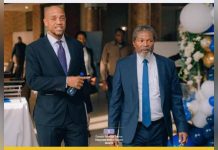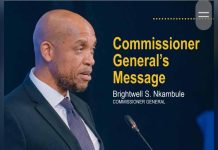
By Zweli Martin Dlamini
Africa-Press – Eswatini. Credibility remains the critical pillar of journalism.
As an independent online publication,we reported that Prince Sicalo,the Principal Secretary in the Ministry of Defense and State Security is allegedly one of the masterminds in the attempt to overthrow Felix Tshisekedi,the democratically elected President of the Democratic Republic of Congo(DRC), Sicalo was a friend to Christian Malanga,the leader of the rebels.
As usual,Times editor Mfankhona Nkambule decided to become the bullet proof and/or a fire extinguisher for the Prince who attempted to destabilize another country by supporting the DRC rebels,Mfankhona Nkambule is now one of the few journalists trusted by the regime as its defender and his credibility remains questionable.
But if Nkambule thinks he can successfully cast aspersions on articles published by this independent publication and quoted even by the international media, just to please the appointing authority,that would mean he is the master of journalism.
We might give Nkambule more media mileage so that the people can understand his level of thinking and this, will help because by the time a new angle in the story emerge as DRC law-enforcement agencies interrogate the arrested rebels,emaSwati would have long understood the modus operandi of the Times.
I remember in 2020 when the State unleashed journalists trying to bury this independent online amid the battle of narratives,the State was seeking to use journalism as it has been doing, as a tool of oppression to mislead the masses.
But in the midst of the that battle of narratives, I had to choose among the State journalists who to address and dedicate my attention to by responding,it was Mbongeni Mbingo, Alec Lushaba and Welcome Dlamini.
Mbingo eventually fell and was suspended while Lushaba and Welcome joined politics as Members of Parliament(MPs), now it seems I’m left with only Mfankhona.
It worth-mentioning that, if the State has chosen Mfankhona Nkambule to fight or cast aspersions on this publication,let me declare that I am ready for him,we will publish the truth and Nkambule will come and defend with lies.
At the end, we will check the Times of eSwatini circulation, the number of copies purchased in the various shops will give us an idea if the people prefer the truth or the Times lies.
As mentioned, in the midst of the battle of narratives,the people will ‘vote’ through buying the Times copies,currently the press as over 2million readers on the website, about 300 000 Facebook followers and 63 000 X(formerly Twitter) followers.
The State has contributed to this huge following by trying to bury this publication and State controlled journalists have been complicit to this.
Now,regarding the Democratic Republic of Congo(DRC) attempted coup,it seems the Times editor is determined to clean Prince Sicalo but unfortunately the evidence is overwhelming.
In journalism, there’s a difference between providing more mileage to the State as the Times always do, to defend itself and, writing an opinion article in defense of an individual accused of wrongdoing.
An opinion article reflects the level of thinking or the position of that particular editor on the subject matter.
The term “allegedly” appears more than a thousand times in articles published by the media worldwide and it’s a standard practice in line with the presumption of innocence until proven guilty but, a journalist cannot just allege without supporting evidence in terms of the “balance of probabilities” principle.
Christian Malanga,the leader of the rebels reffered to Prince Sicalo as his Military Advisor and based on this ‘confession’, even without the other documentary evidence, the Defense Principal Secretary who holds public office, is obligated to account and clarify his relationship with the killed DRC rebel leader.
The Times editor can defend Sicalo,unfortunately the power of journalism is not sourced from Nokwane Army Headquarters or Ludzidzini Palace but vests with the people, it is the people who decides the popularity of journalists of a publication not public figures.
I sometimes receive information from royal family members,others would say “sitsi asiyinike wena lendzaba lena ngoba siyati Times ngeke iyikhiphe” and this should be an eye opener to Nkambule that, slowly, the credibility of that publication is being tainted.
A new angle in the Democratic Republic of Congo(DRC) attempted coup story is yet to develop, Nkambule should have at least continued with the fake online platform State project where, together with Welcome Dlamini and others, they were publishing propaganda with intend to influence the public discourse.
Mfankhona is staying in eSwatini but he is not even aware that Prince Sicalo sometimes drives around the country at night with a LandCruizer loaded with guns,he would tell law enforcement officers in roadblocks that he is patrolling the country, ubuka live kutsi lime njani.
I am therefore surprised to see a Times journalist defending Prince Sicalo, when Mfankhona is asleep, he is not even aware what Sicalo is doing.
The problem with some of these captured journalists is that,they think our level of thinking is equivalent to theirs,Prince Sicalo has been involved in dirty assassination plots and outcomes of the DRC rebels interrogation will give us more idea who we are dealing with.
But in conclusion, let me make it clear that, the centre of power in the media long shifted and it will never be possible to mislead the world about the eSwatini mafia State where human rights defenders are killed with impunity.
The Times has been misleading emaSwati all these years but in the issue of the DRC attempted coup, Nkambule must know that investigations are ongoing and will receive an update.
Personally, I have no problem with Prince Sicalo I have spoken to him several times including during our mediation after he filed a court case against me but,as a public figure in charge of the Ministry of Defense and State Security,he must account for allegedly supporting rebels in an attempt to topple the DRC democratically elected Government.
Journalists who worship those in power with the hope that one day, they will be remembered during appointments but at the same time, appear to be acting in the public interest are dangerous because they feed the public with poisonous information,while supporting oppression and injustice against the powerless citizens.
Source: Swaziland News
For More News And Analysis About Eswatini Follow Africa-Press






